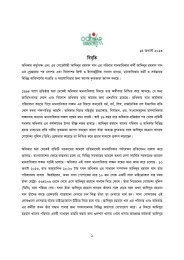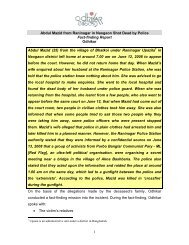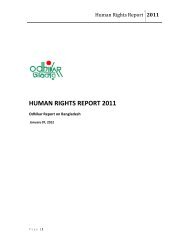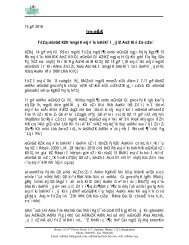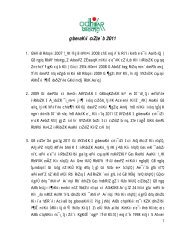Please - Odhikar
Please - Odhikar
Please - Odhikar
Create successful ePaper yourself
Turn your PDF publications into a flip-book with our unique Google optimized e-Paper software.
not constitute the whole media in this country. Today, news has been published that a middle<br />
aged person tried to assault a female student of Shahjalal University. This person has four wives<br />
and two maidservants at home, with whom he can do whatever he wants. But four newspapers<br />
published the name of that girl. If a newspaper reveals a victims name, the department she<br />
studies in, you can easily understand that media is subjecting that girl to further social isolation<br />
and stigmatization or even social degradation. This is not a new phenomenon in Bangladesh.<br />
The other day in another seminar we were talking about the victims of trafficking. And we<br />
agreed on that issue that there should be some guidelines, some code of ethics in case of<br />
covering their news. We have scanned several newspapers and it is quite alarming that the names<br />
and identity of the victims of trafficking have been exposed in those newspapers. In one of the<br />
most well established and well-circulated dailies in Bangladesh the pictures of the victims were<br />
even printed. That newspaper published a story of an 18-year-old girl who was trafficked to the<br />
Middle East and was rescued afterwards. What benefit is the paper giving her by printing her<br />
story with her picture? Isn't it a further victimization of the girl again?<br />
Syed Fahim Munaim: Thank you for your speech and definitely you have provoked me to<br />
speak. We have told the reporters to not to print the names, identity or pictures of any rape<br />
victims. We don't even print any picture of any gruesome murders. No point of victimizing the<br />
victim again. However,as you say, there are both good and bad elements of the media. Believe<br />
me we are also a part of the society, we have relatives all around, we are part of the whole<br />
country. So, what we print we can be subjected to that as well. I will definitely talk to other<br />
editors when I will get time. It is also true that newspapers never ever get the chance to know the<br />
entire system, the laws, the procedures and the whole process. Our honorable judges are here,<br />
this is there subject, and they know all those things associated with it. A media person or a<br />
reporter is not specialized in this particular area and they don't know everything. May be you<br />
would say that it is your problem, not ours. Why don't you get people specialized in this sector?<br />
We are looking into the matter and we are definitely focusing on that. Because it is not an issue<br />
of one person versus another, it is an issue of the country, human beings and justice.<br />
Maqsudul Haque: Firstly I will disagree a little with Subodh Pyakurel. I am known as a<br />
cultural activist and columnist to the public but professionally I am a risk analyst and my risk<br />
covers all areas from Afghanistan to Vietnam on a daily basis. To be entirely honest I think that<br />
the media in Nepal is free. I get to read almost all the online newspapers on a daily basis,<br />
because it is my job to read them. We do not get any information on the extent of the violence<br />
and the plight of victims because of the fact that the Nepalese media is so badly censored on the<br />
internet. It is the free media blockers of Nepal that tell the world what is going on in Nepal.<br />
Similarly when there is a bomb attack in London, the people were not reading The Observer or<br />
the mainstream media, they were reading what the blockers were saying and who were giving<br />
more information than the mainstream. Consequently here we are in such a situation where the<br />
role of media is far more serious. By implication I think that the media not only in Bangladesh<br />
but also in the whole world is a part and parcel of the whole system of oppression. It is a trickle<br />
down process. It may begin by a compilation of a couple of Ps together: first it is the politician,<br />
secondly it is the police, third is the PR and finally the press. They have the same character. The<br />
character is oppression, the character is demeaning, and they do it with a sort of impunity that is<br />
unheard elsewhere in the world. In Bangladesh, I was the victim of both the state as well as<br />
politics. If you want to read my case, it is available on the website of <strong>Odhikar</strong>. There you will<br />
84<br />
Report 2005




